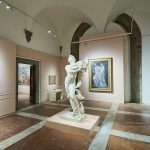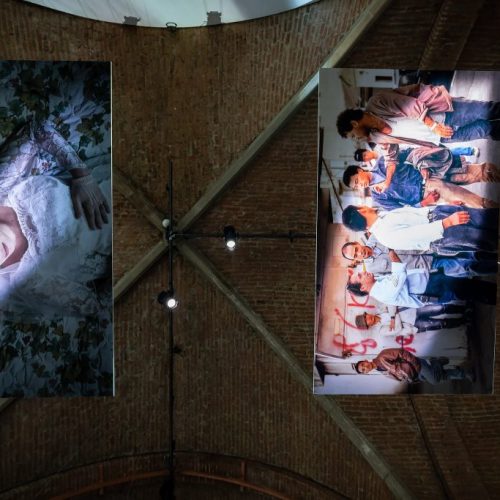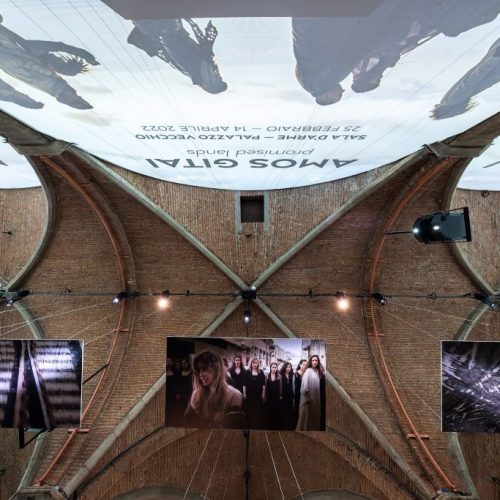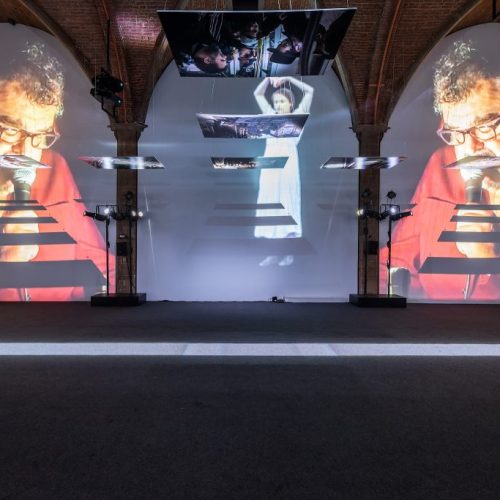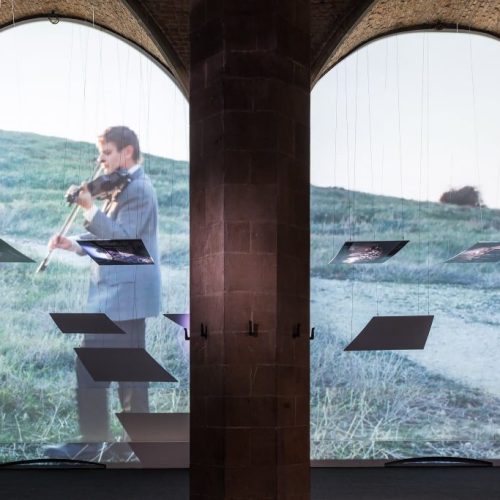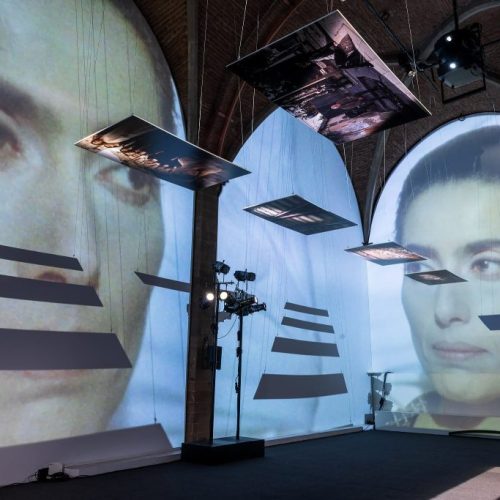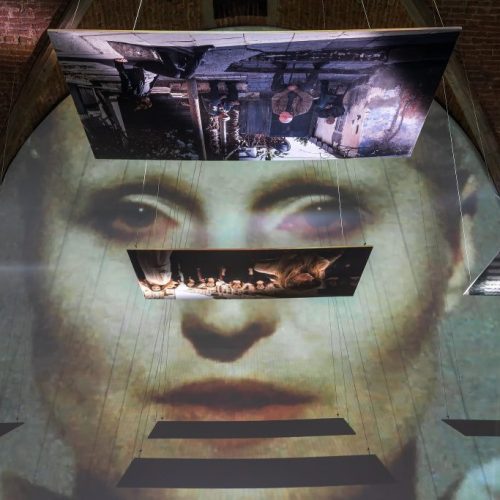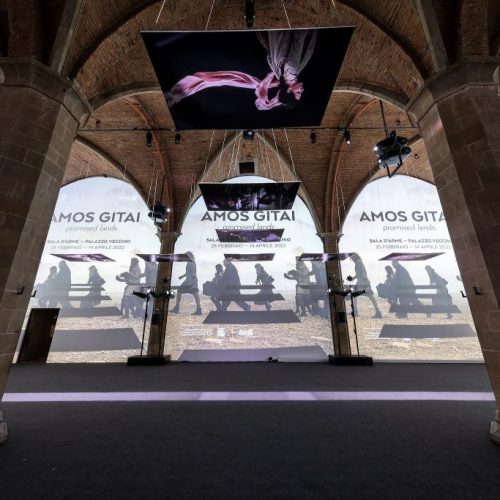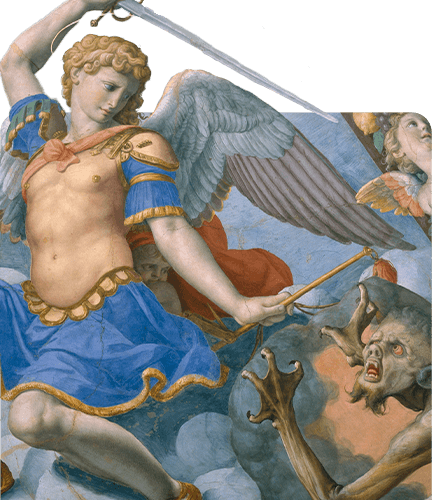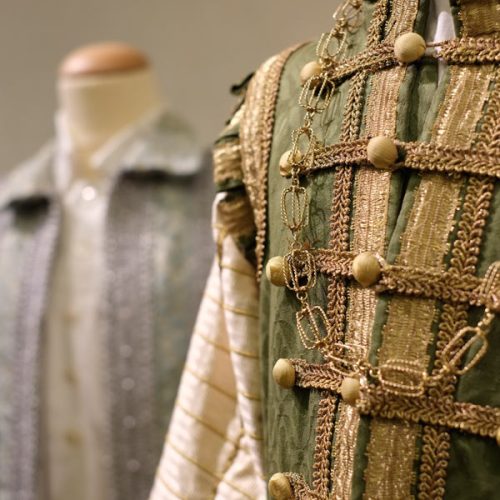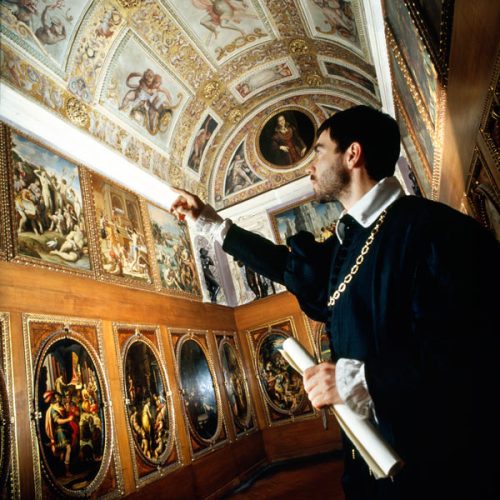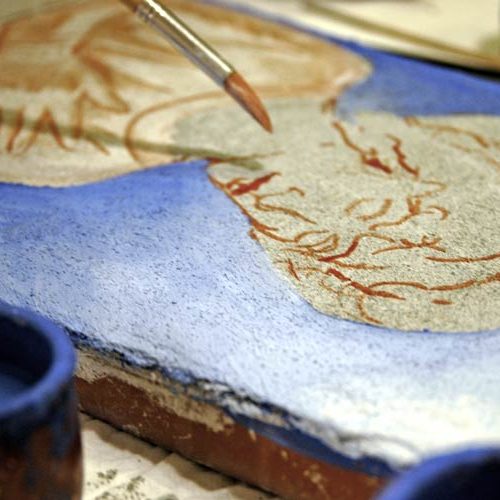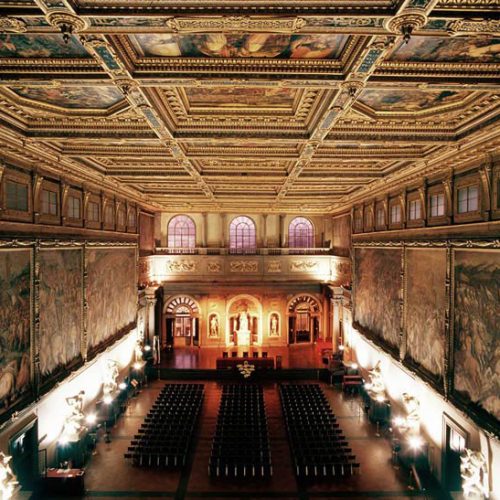AMOS GITAI
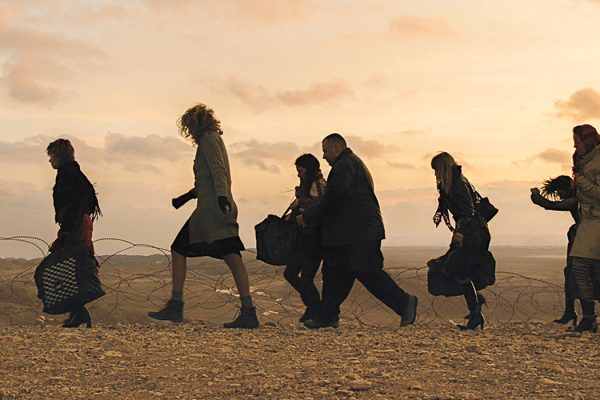
al 18 April 22
Promised lands is the title of the video installation by the international artist and director Amos Gitai, sponsored by the City of Florence and organised by MUS.E in collaboration with AGAV Films, thanks to Toscana Energia. It will be showing from February 28 to April 14 at the Sala d’Arme in the Palazzo Vecchio, in conjunction with the International Conference of Mayors of Mediterranean Cities, scheduled for Florence from February 25 to 27. (The exhibit will be open to the public from Monday 28 February).
Created ad hoc for the Florentine venue by combining musical excerpts, screened images and text readings, Promised lands is an imaginary dialogue between the protagonists of the works created by Amos Gitai over his career. Well-suited to the large walls of the Sala D’Arme, it starts with his theatre and film works, to evoke human destinies, history and the present day in the various languages spoken in the Mediterranean area.
What do The War of the Sons of Light Against the Sons of Darkness (1992, 2009), Yitzhak Rabin, Chronicle of an Assassination (2016, 2018, 2021), Letter to a Friend from Gaza (2019) and Interior Exiles (2020) have in common? This journey through the epochs and languages spoken in the Mediterranean is a political and poetic reflection on contemporary human destinies and the possibility of living together. To make it even more evocative, the voices of Jeanne Moreau, Pippo Del Bono, Natalie Dessay, Juliette Binoche, Yael Abecassis, Hiam Abbas, and Makram Khouty will be broadcast throughout, accompanying the visitor on their immersive experience, amplified by the series of photographs descending from the ceiling.
Visitors will see excerpts, projected onto the walls of the Sala D’Arme in a loop, from the correspondence between Efratia Gitai (1994-2003), Amos’s mother, and his father Elihau, from the feature film Lullaby to my Father, where the director retraces the life of his father Munio. They will hear Antonio Gramsci’s letters from prison performed by Pippo del Bono from the work Interior Exiles, created by Gitai for the Theatre de la Ville in Paris in 2020. Then excerpts from Tsili, a film inspired by the autobiographical novel by Aharon Appelfeld, about the wanderings of characters in the nightmarish setting of war. To follow, excerpts from Kippur, a feature film in which the director retraces his dramatic experience during the war of Yom Kippur. Then, Field Diary, a film-diary shot in the occupied territories before and during the invasion of Lebanon. This is followed by Ananas/Pineapple, a reportage about denunciation, and The War of the Sons of Light Against the Sons of Darkness, based on The Jewish War, by the ancient historian Flavius Josephus, with Jeanne Moreau in the role of Flavius Josephus. In The book of Amos, shot on a street in Tel Aviv, Israeli and Palestinian actors and actresses play the role of the prophet Amos and give a modern voice, in Hebrew and Arabic, to his ancient denunciation of corruption and social injustice. Next are Kedma, which takes its name from the ship loaded with Holocaust survivors traveling to the Promised Land at the end of the Second World War, and Golem, the Spirit of Exile, a film that investigates the contemporary meanings of the Book of Ruth in the Bible. It ends with Yitzhak Rabin: Chronicle of an Assassination, about the assassination of the Israeli prime minister, which took place on November 4, 1995, after a pro-peace, anti-violence demonstration in Tel Aviv.
An immersive journey into the works of the Israeli artist and filmmaker who, thanks to his vast opus of theatre pieces and films, manages to weave together human destinies, history and present day in the voices of the Mediterranean.
Video proiettati sulle pareti della Sala D’Arme:
Lullaby to my Father, 2012
Tsili, 2014
Interior Exiles, 2020
Kippur, 2000
Field Diary, 1982
Pineapple, 1983
The War of the Sons of Light against the Sons of Darkness, 2009
The Book of Amos, 2012
Kedma, 2002
Golem, The Spirit of Exile, 1991
Yitzhak Rabin: Chronicle of an Assassination, 2016
Amos Gitai was born in 1950 in Haifa (Israel). He is the son of the Bauhaus-trained architect, Munio Weinraub, who fled the Nazi regime in 1933, and the intellectual and teacher, Efratia Gitai, a non-religious expert on Biblical texts, who was born in Palestine in the early 20th century. He belongs to the first generation born after the foundation of the State of Israel, which was also strongly influenced by the major anti-establishment youth movements of the 1960s.
While still a student studying architecture, Gitai was wounded during the Yom Kippur War (1973), when a medical evacuation helicopter in which he was traveling was hit by a Syrian missile. His entire œuvre then went on to draw inspiration from these biographical, family and generational themes, as well as the trauma he suffered during the war, and the sense of a victorious life.
After receiving a PhD in architecture from the University of Berkeley (California), Amos Gitai devoted his first film, House (1980), to the construction of a house in West Jerusalem. This documentary, which the Israeli television refused to broadcast, set the tone for the filmmaker’s antagonistic relationship with the authorities in his country, which was soon exacerbated by the fresh controversy provoked by his film Field Diary (1982). Gitai settled in Paris and shot several films, both fictional works and documentaries, including Esther (1986), Berlin-Jerusalem (1989) and Golem, the Spirit of Exile (1991).
Amos Gitai returned to Israel in 1993, the year in which the peace agreements championed by Yitzhak Rabin were signed in Washington. He directed a three-city trilogy: Devarim, shot in Tel Aviv (1995), Yom Yom in Haifa (1998) and Kadosh in Jerusalem (1999). Between 1999 and 2020, four of his films were shown in competition at the Cannes Film Festival (Kadosh, Kippur, Kedma, and Free Zone), and a further eight at the Mostra in Venice (Berlin Jerusalem, Eden, Alila, Promised Land, Ana Arabia, Yitzhak Rabin: the Last Day, A Tramway in Jerusalem and Laila in Haifa).
In 2010, he published his mother Efratia’s correspondence1, which was read by Jeanne Moreau at the Odéon-Théâtre de l’Europe and on the France Culture radio station. In April 2018, the filmmaker donated his entire paper and digital archive of almost 30,000 items on Yitzhak Rabin to the Bibliothèque nationale de France (BNF).
Amos Gitai’s work has received numerous awards, including a Leopard of Honour in Locarno for his lifetime’s work (2008), the Roberto Rossellini Prize (2005), the Robert Bresson Prize (2013), and the Paradjanov Prize (2014). He has been awarded the distinctions of officier des Arts et Lettres and chevalier de la Légion d’honneur. In 2019 he received the Grande Ufficiale dell’Ordine della Stella Italia.
Retrospectives of his complete works have been presented at numerous institutions worldwide: Centre Pompidou; Cinémathèque française; Jerusalem Cinematheque; New York Museum of Modern Art (MoMA); Lincoln Center (New York); British Film Institute (London); Museo Reina Sofia (Madrid); Mostra São Paulo; State Film Museum (Moscow); Japan Film Institute (Tokyo), Kolkata International Film Festival.
Download the exhibit guide
Promoted by Comune di Firenze
Organized by MUS.E
In collaboration with AGAV Films
Sponsor Toscana Energia


